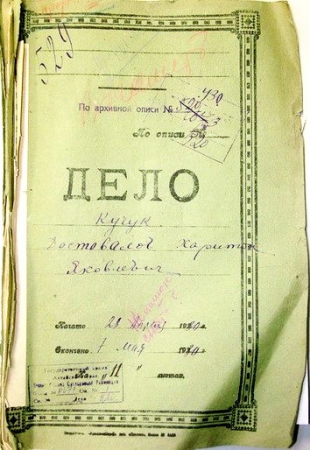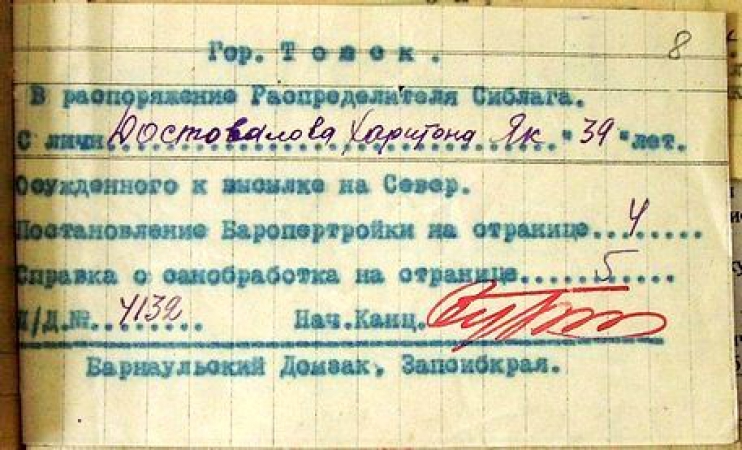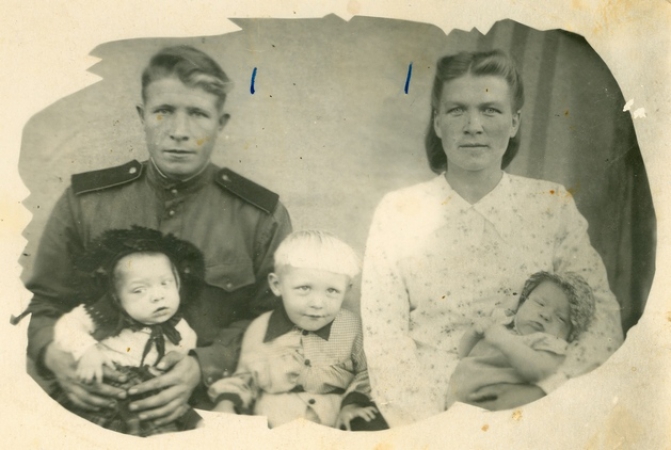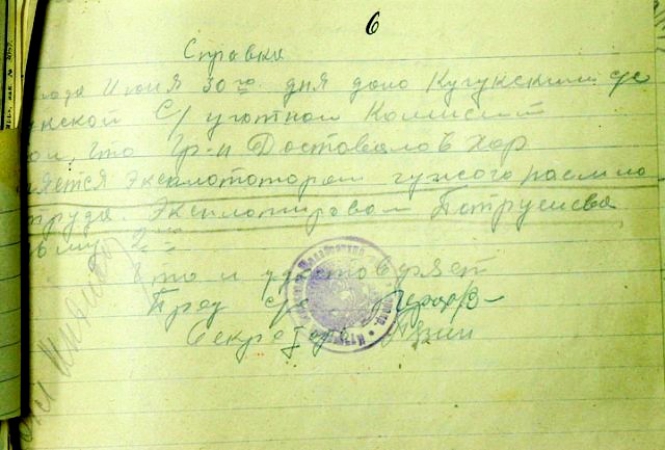Personal experience: Fyodor Shabanov
Our reporter Paulina Nikolaeva had a chat with Fyodor Shabanov, a lawyer who repeatedly has published results of his family archival investigations online. One of these publishings is dedicated to his great-grandfather Khariton Dostovalov, who was de-kulakizated in 1930. Not only did Fyodor Shabonov manage to find the file of his great-grandfather, but also achieved rehabilitation and compensation for the property that had been taken away.
– Fyodor, why did you decide to engage in archival research? At what point in your life? What motivated you to do this?
– Since a long time I am doing genealogy investigations on our family. The very earliest ancestors I managed to find lived in the mid-17th-century. When you are interested in the lives of faraway kinsmen that you know nothing about there is an enormous space for fantasies and speculations. But, of course, these people didn't live isolated. They are associated to the geography and have a social background. You find them in documents and understand how they fit into the historical canvas. The history of our motherland is rich, there were many wars and revolutions in the past. When you find names of relatives in documents about game-changing times, the political repressions during the 1930’s for example, you feel something stronger than when you see the same surnames in some household census from years that were calmer. To get to know the history through the examples of your own relatives is very fascinating.
– What information did you have when you began your archival research?
– In 2007 my mom told me how she found out herself that her father and grandfather had been de-kulakizated. She was already 25 years old, was working at the Tomsk Research Institute and was a party candidate. She went to her parents’ place for vacation and was hay harvesting with her father when he opened up about this. He told her that they had had a small shoemaker shop, that his father was dressing skins, sticking shoes and hiring farm workers. Then they were de-kulakizated and deported… This wasn’t talked about in the family, not to ruin the lives of the children and grandchildren. Later I found out that my great-grandfather in addition to this had run away from the prison camp, and it became twice as clear why this subject was hid away in the family. When I found out about this de-kulakization I understood that there is a chance of finding a concrete archival file. Files on political repressions are stored in certain archival funds, therefor their preservation is often quite good. I was hoping to find a lot of interesting information on my ancestors’ personal participation in these events. At that time I was working at one of the oil companies, Yukos, and participated in a row of legal arguments with the tax authorities as part of ”The Yukos Case”. These events had something in common: the repressions and the problems of today. This parallel made my interest even stronger.
– How did you find out from where to start your archival research?
– My legal education and experience came in handy. In addition to this, as a deputy of the City Duma I had already had to help people in their search for archival information and rehabilitations. When people seek advice they most often experience a lack of information, they don’t know where to turn to. They know the family legend: in best case told by their groundlessly repressed relatives, and in worse case by hearsay from grandfathers and grandmothers. They make a request to the archive, get a formal denial, and that’s it. A dead end. And later it turns out that they just didn’t write the request accurately, or even that they had turned to the wrong archive. I read the law on rehabilitation of victims of political repressions and can show the right operating procedure. Since I knew the place of residence of my great-grandfather before the de-kulakization I decided to turn to the archive of that krai as a first step.
– Exactly to which government entities did you turn to for this information, how did you find the file?
– At first I wrote a normal letter of application to the State Archive of the Altai Krai in Barnaul – I just described what I knew. They have an archival fund that for some reason is called the Fund of the October Revolution, and in there files on de-kulakizations are stored, among others. I got a plain document from the archive, where the circumstances were specified: Yes, he was de-kulakizated; the family members; the property; based on what sources and so on. The document was very brief, and I was interested in finding a full, administrative case about the de-kulakization. Here a difficulty occurred: in order to get access to the file the persons in it should already be rehabilitated. Since these are criminal and administrative files according to which these people are still considered to be criminals, these files remain classified. I needed a certificate of rehabilitation in other words, as well as proof of my blood relation to him. To prove consanguinity with the great-grandfather on my mother’s side is not that simple, and unfortunately I didn’t have the right documents.
Then I turned to the Information Center of the Chief Directorate of Internal Affairs of the Altai krai. According to the law the public prosecution office and the internal affairs bodies are the ones obliged to look through files. The public prosecution office is the one looking through court sentences, while the repressions that were carried out in administrative procedures are on the Ministry of Internal Affairs’ plate. The authorized agency handling the specific file I was interested was the Information Center of the Chief Directorate of Internal Affairs of the Altai krai – a special subdivision that among other things is occupied with questions of rehabilitations. After receiving the archival document I sent a request there: I asked them to tell me whether my relatives had been rehabilitated or not, and if not, to look through the file and make a decision of rehabilitation, in case they really were innocent and were subject to the repressions due to political motives, and not because of some economic offenses. The answer: they had made the enquiry, but in the file it came up that my great-grandfather had left with his family and went to an uncertain direction, and there was not any information about a forced eviction, and therefor they didn’t think that the family had went through a de-kulakization. That is, the Chief Directorate of Internal Affairs of the Altai krai only saw the preliminary banishment, although this kind of repression involved first of all a confiscation of assets, and secondly banishment, but this wasn’t necessarily a consequence. My great-grandfather was declared to be a kulak of the second category, and people of the first category were simply shot. Repressions is a way of extortion. Regarding persons who were admitted kulaks it primarily consisted of simply robbing them. The assets were given to some kolkhoz or to the municipality. In the file of my great-grandfather it says that property to a value of 307 rubles and 80 kopeks was expropriated. People were left without means of existence, even any minimal means. Even personal belongings were confiscated during the de-kulakizations. Later I found evidence on the character of the de-kulakizations in that particular village: people compressed their warm clothes into a clunch, wrapped it up in tatters giving it the shape of a ball, and then gave it to the children, who pretended to play with it. This was to save at least something from the robbery! I, as a lawyer, was interested in trying both ways there are to achieve rehabilitation through a court case. The first way is to appeal against the denial of the public authority. I handed the court a statement of recognition of illegal denial of rehabilitation by the Information Center of the Chief Directorate of Internal Affairs of the Altai krai. The second way is to establish a legally valid fact. We have a procedure like this, defined by the law: when a person can’t prove his right using some special documents, then he can in the presence of witnesses and bits of information from preserved documents turn to the court and compensate for the lack of the special document with a court ruling. In the end two trials took place. The first one was about the establishing of a legally relevant fact. The court reached the conclusion that yes, there had been a de-kulakization. They acknowledged this fact. The second trial took place a bit later, and was about acknowledging the illegal denial of rehabilitation, but this judge refused to acknowledge the denial of the Chief Directorate of Internal Affairs as illegal! Only because the de-kulakization as a legally relevant fact was already established, and the hindrances to rehabilitation kind of went away by themselves. That’s the juridical paradox that occurred, that from my point of view was completely illegal. But nonetheless I reached a favorable result at the end.
– Did you get access to the file after this, or did new difficulties occur?
– It is needed to specify that the ruling by the court is not a certificate of rehabilitation in itself. The certificate of rehabilitation is issued by a department of the Ministry of Internal Affairs on the basis of the court ruling. After the entry of the decision into legal force I therefor sent it to the Information Center of the Chief Directorate of Internal Affairs of the Altai krai. But they still wouldn’t give me the certificate – the employees of the Information Center of the Chief Directorate of Internal Affairs of the Altai krai demanded not only a copy of the court ruling, but a copy authenticated by a notary! According to the law it can’t be like that, because no one doubts the authenticity of these documents since it’s easy to check. But there was nothing else to do than to jump over also this obstacle. I turned to the court again and asked them to acknowledge this illegal refusal of issuing a certificate and the court was obviously surprised and acknowledged the demands of the Information Center of the Chief Directorate of Internal Affairs of the Altai krai as illegal. After this they finally sent me all certificates of rehabilitation to the family of my great-grandfather, but the certificates were incorrectly designed. The kind of repression was incorrectly specified, as well as the basis on which it was carried out. There were also mistakes concerning the names. They had used the modern name of the administrative territorial division, even though you need to name the place as it was called back then, during the 1930’s. I was pissed off by then and wrote to them in detail about this, threatening them with a new trial. But the common sense won and after this I got new certificates that were correctly executed. But I have to say that not all organs counteract you like that, for example the employees of the Information Center of the Chief Directorate of Internal Affairs of Tomsk Oblast are very correct and understanding.
– Did you in the end get access to all archives?
– Yes. I eventually found two files on the de-kulakization of my great-grandfather that were stored in different places. The administrative file about the de-kulakization was located in the State Archive of the Altai krai – where the repressions took place. One year after the de-kulakization my great-grandfather was sentenced for not fulfilling a ”compulsory task” according to the criminal charges, and for this part he wasn’t formally rehabilitated. The second file is about convicted deportees and is located in the archive of the Information Center of the Chief Directorate of Internal Affairs of Tomsk Oblast. It turned out that the court had sentenced my great-grandfather to a penalty and one year of deprivation of liberty, but on the instruction of a Siberian prison camp of the Joint State Political Directorate the ”opertrojka” changed the sentence to a ”deportation to the North” (with capital letter!). Please note that the penalty was 300 rubles, and the possessions that had been confiscated during the de-kulakization had been valued to 307 rubles! Not fulfilling a compulsory task you could consider to be a normal crime, and the sentence to be normal, criminal repression, but it also has a distinct characteristic of political repression: my great-grandfather was already recognized as a kulak, and the impossible task was assigned to him because he was a kulak. This label means discrimination on a social and material basis, it’s a political motive for a criminal case. But at the same time it’s hard to win over the court practice. But the chairman of the Presidential Commission of Rehabilitation of Victims of Political Repressions Mityukov agrees with me, I have an answer from him. I need to tell about one other important thing. My epopea of getting access to archival files might not be relevant for your readers. Time goes by, and a general rule has been established by the law: after 75 years archival files become accessible not only for relatives of rehabilitated persons, but also for any third party who wants to have a look at these files. In theory, if someone wants to find documents on his great-grandfather from the 1930’s, he can just refer to this law on the 75-year time period, since today it’s 2015. But in reality it’s more complicated than this – many innocent persons have still not been rehabilitated, and their files remain classified. Therefor I think that the problems with getting access will remain.
– To return to the subject of the institutions that were supposed to give you access to the information, how do you think they could change their way of working?
– The archives aren’t that challenging. They follow the accession order, and if there isn’t any legal objections they give you green light. It’s another question that all the planned work on declassifying and looking through files and rehabilitating victims that was outlined in the beginning of the 1990’s has gradually ceased away. For example, the public prosecution authorities got special governmental funding for prosecutors who would look through files about the repressions. This led to a bigger staff of prosecutors. Then this assignment was shut down, and employees were reoriented to other tasks. The subject of rehabilitation of victims of repressions has almost completely went from being a state matter to a private matter. The denials by the Ministry of Internal Affairs or the public prosecution office that now take place are just an attempt to shuffle off the burden on the judicial authorities. They actually say out loud: ”We don’t want to take this responsibility upon us, go to the court to prove your point”. The departments don’t have any motivation to take on this work, and furthermore this brings about budget payments. It’s since a long time clear that today’s government don’t want to get engaged in the Soviet state’s political repressions. This also becomes clear from the fact that the allowances and payments to repressed and then rehabilitated people have been lowered. For example, the law says that the compensation for possessions that were confiscated during the repressions must be fair and raised. There is a bunch of decisions by the Constitutional Curt that the Russian government should have looked over and raised the payments a long time ago. But the law as well as the decisions by the Constitutional Court are ignored by both the executive and legislative power. Comparable bills haven’t been deviated once, and one of the most important judges in the country doesn’t have any possibility to make an impact. Another example: according to the law all information about rehabilitation of political victims should be published in mass media, but in reality no one is doing this. For example, the Information Center of the Chief Directorate of Internal Affairs of the Altai krai answered me that there is such an obligation, but that they don’t have any money set aside for this. In all of this I see more and more red flags. The law turns into a cloud when there is no public demand for it, when it isn’t asked for by life itself, by people.
– What do you think, is this because the government isn’t willing to take on this responsibility, because they want to forget and hush up these facts?
– It starts with intentional concealment and ends with indifference. ”That was a long time ago, why do we have to be occupied with that, why should we have to pay for the sins of a former government?” You can hear all kinds of opinions on this subject. Even I get asked by my acquaintances: ”1930 – that’s such a long time ago, that was during the last century, what is is that you want to squeeze out from somebody, and what do you want to achieve? Many people were astounded when I got compensation for the property that had been confiscated in 1930. If you can consider this sum of ten thousand rubles to be a compensation. I didn’t get it by the way, my Mom did. And she spent it on a new memorial monument to my great-grandfather on the graveyard. Not long ago I visited the Legislative Duma of Tomsk Oblast and as the vice-chairman of our City Duma I tried to carry through an important bill: we would like the allowances for families with many children to be brought back, that were incorporated in the old Federal Law on Education but withdrawn in 2013. How is this relevant to our subject? Even the allowances of today – well-defined, understandable, evident and needed – are withdrawn without any reason. Without any legal reason, more precisely. They are taking away the allowances connected to the daycare fees: families with many children used to pay only 50%, but now they pay the whole sum. The compensation used to be a percentage of the factual payment, but today it’s an estimated average. I tried to convince the regional deputies that the norm should go back to the norm of the federal law, but even on the level of our own deputies I got a denial. Everyone understands that the payment will be made from the regional budget. And then we have militaries, deceived by a house or an apartment, as well as Chernobyl veterans. This concerns contemporary issues. Payments to repressed persons are also included in the federal and regional budgets. Even if I as a local deputy raise the question of why not increase the compensations to poor, repressed old persons I get the answer: ”But for that we have to pay from our current pocket, from the regional budget we have today!” The Stalinist repressions remained in the distant past, today’s public servants don’t see any evident connection between this tragedy and today’s world. It’s not that this subject is irrelevant, but to many people it’s just strange!
– You said that many of your acquaintances were surprised by your activities. What do You think, is this subject as irrelevant to people in general as it is to the government, and is a change of the attitudes towards archival information possible right now, is it possible to make this subject relevant?
– Let’s begin with a far-distance view: the subject of repressions is still sore and controversial. There is a range of opinions from ”You were innocent, and Stalin a bloodthirsty tyrant” to ”There used to be order, and during Stalin’s time people just didn’t do like that”. As a lawyer I remember that in the enacting clause of the law on rehabilitation is clearly says: ”During the Soviet regime millions of people became victims of the despotism of this totalitarian regime and suffered from repressions because of their political and religious creed based upon social, ethnical and other characteristics. This is not just somebody’s opinion, it’s the federal law! Unfortunately there is a lot of attempts by our citizens (and even politicians) to create a new view on the past. I don’t support the wish to rename Volgograd to Stalingrad. The politics of condemning the repressions should also in the future have support on a state level. And it’s no less important that people themselves should decide whether they need this information or not. When I speak to friends and acquaintances I often have to illustrate my interest for history with a personal example. Quite a few of my acquaintances became interested in their own family history after I told them my stories, and they often found out amazing things. I am even jealous when someone manages to find out more striking and interesting facts than me. But except for the repressions there are many other historic periods and events. My interest in the Great Patriotic War in 1941–45 grew when the data basis OBD-Memorial and The feat of the people appeared. For this I am thankful to the state and to those who carried out these projects! The lists of repressed persons on the site of Memorial International are also very popular, a lot of people use them when they study genealogy. There you can see the region of residence, the frequency of a particular surname, migrations and so on. If the data base of repressed persons was regularly updated and contained even more details, and if users had the opportunity to add information to it, this would be useful and interesting to a lot of people. Some people are really interested in genealogy and just want to penetrate the jungle of the distaff side and the collateral lines, while others don’t know their relatives and don’t have any wish to do so.
– Is it needed to revitalize, create and maintain people’s interest for archives?
– Who needs to, finds. This is a question of personal and family interest. The question of how to preserve our documentary heritage is a lot more important. If there were funds a researcher is always to be found.
– Fyodor, thank you for the interview!
The note:
The 30th of June 1930 it was presented by Kuchuksky Village Council and the Kuchusky Accounting Commission that the citizen Dostovalov Khor. is functioning as an intermediary for foreign work labour. He exploited Patrushev Kuzma for two months.
Which is certified by the chairman of the village council (the signature is indecipherable)
Secretary (the signature is indecipherable)
(Seal of the Kuchusky Village Council).










